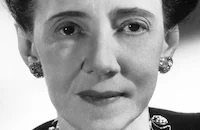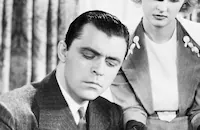Go West Young Man
Brief Synopsis
Cast & Crew
Henry Hathaway
Mae West
Warren William
Randolph Scott
Alice Brady
Elizabeth Patterson
Film Details
Technical Specs

Synopsis
While on tour in Washington, D. C. to promote her film, Drifting Lady , glamorous movie star Mavis Arden charms her public, giving the appearance of a demure woman, instead of the prurient and temperamental person she really is. While Mavis discreetly dines with her old flame, Francis X. Harrigan, who is running for Congress, her press agent, Morgan, calls the press in to interrupt the rendezvous, hoping to create a scandal for the politician so that he will lose interest in Mavis. Mavis gives them an impromptu speech about the country needing more marriages, which appears in the papers the next day. Harrigan is about to write a rebuttal, when his friend, Andy Kelton, calls Harrigan's interview with Mavis the cleverest political maneuver he has ever made, certain that he will win the votes of every spinster in the country. Harrigan is now more determined than ever to meet Mavis at her next stop, Harrisburg, Pennsylvania. Because a clause in Mavis' contract with Superfine Pictures, Inc. forbids her to marry for five years, she is "very susceptible" to the affections of men, and it is Morgan's job to be sure she is not tempted. Resuming her tour, Mavis is held over in a small town ninety miles outside Harrisburg when her customized Rolls Royce breaks down. Although anxious to meet Harrigan, Mavis soon turns her attentions to Bud Norton, her car mechanic, admiring his "large and sinewy muscles." Bud, however, is engaged to Joyce, whose once-prominent family runs "The Haven," a quaint boardinghouse where Mavis stays. Despite Morgan's efforts to keep Mavis from Bud, she seduces him in the boardinghouse parlor while he demonstrates his movie sound machine, which she promises to promote in Hollywood. Joyce is heart-broken, and her aunt Kate, a spinster, advises her to fight for her man before he leaves for Hollywood. Meanwhile, Harrigan tries to reach Mavis by telephone and, while waiting on the line, he hears one of the operators reading aloud a newspaper headline about a kidnapping; Harrigan mistakenly concludes that Mavis has been kidnapped. Gladys, The Haven's star-struck maid, hears about Mavis' kidnapping on the radio and, believing that Morgan is her captor, calls the police. The next day, when Morgan tells Mavis that Joyce is pregnant, Mavis tells Bud, who has already packed a suitcase, that her affection for him was just "a mad, mad whim," only to find out later that Morgan was lying. When the police arrive with Harrigan and Gladys to arrest the alleged kidnapper, Mavis, furious with Morgan for endlessly meddling in her love affairs, and believing that he staged the incident as a joke, allows the police to arrest him. Morgan then confesses that his real reason for interfering was his own love for Mavis. Driving away with a police escort, Mavis and Morgan kiss.

Director

Henry Hathaway
Cast

Mae West

Warren William

Randolph Scott

Alice Brady

Elizabeth Patterson

Lyle Talbot

Isabel Jewell
Margaret Perry

Etienne Girardot
Maynard Holmes
John Indrisano
Alice Ardelle
Nicodemus Stewart

Charles Irwin

Walter Walker

Jack Larue
G. P. Huntley Jr.
Robert Baikoff
Xavier Cugat And His Orchestra
Crew
John Burke
Emanuel Cohen
Ray Curtiss
Hugo Grenzbach
Wiard Ihnen
Arthur Johnston
Irene Jones
Holly Morse
Victor Shapiro
George Stoll
Karl Struss
Mae West
Adolph Zukor

Film Details
Technical Specs

Quotes
Trivia
Notes
An early script title for this film was Personal Appearance, the title of the play on which the picture was based. The Broadway production of Personal Appearance had over 500 performances. Elizabeth Patterson also played the part of Aunt Kate in the stage production. According to a news item in the New York Times on March 1, 1936, while Mae West negotiated for the rights to the play (for which the play's producer, Brock Pemberton, was reportedly asking $100,000), the play was being banned unofficially in Hollywood because of its "lampooning theme." Production for Go West Young Man lasted forty days. A news item in the New York Times on March 1, 1936 states that Mae West said she planned to go to Columbia Pictures with Emanuel Cohen, even though Paramount declared it had exercised its option and wanted West to make two more pictures with the studio-one to start 1 April and the second to start July 1, 1936. According to letters in the MPAA/PCA Collection at the AMPAS Library, Columbia Pictures had at one time considered making the film and made a formal query to the Hays Office to see if the play had been banned. The Office responded that the play had not gone through "official formula" but that many member company presidents and motion picture exhibitors were against a film which "might cast adverse reflection on the private lives of motion picture stars." According to MPPDA letters, Columbia producer Irving Briskin agreed and decided to forgo making the film.
According to a news item in Film Daily in April 1936, Cohen, formerly the head of Paramount, had been producing for Columbia and planned to independently produce eight pictures a year for three years for Major Pictures Corp. to be released through Paramount. As reported in contemporary sources, Go West Young Man was the first Major Pictures production and marked the beginning of West's contract with Major. Major Pictures completely rebuilt the General Service Studio in Hollywood, and this was the first picture shot on the new lot. Although West's character is listed in the screen credits as "Mavis," she is definitely called "Marvis" in the film. Several reviews refer to Lyle Talbot's character as Francis X. O'Hennessy, although the film calls him Harrigan. Isabel Jewell does an imitation of Marlene Dietrich in this film. A Motion Picture Herald review of this film states that "Miss West...enjoys an immunity from the...Production Code" and Daily Variety reports that "for all its broad lines and its calculated entertainment vulgarity, the picture doesn't overstep the bounds of offensiveness within the censorial permissions." Joseph I. Breen, Director of the Studio Relations Office of the AMPP, disagreed. According to the MPPDA files, Breen approved the film, allowing that it contained "little that is reasonably censorable," only after numerous admonitions to Cohen against including objectionable dialogue and situations.
Additional letters in the MPPDA file on this film relate the following information: On June 3, 1936, Daily Variety reported that the Hays Office had "given its blessing to [the] script of Personal Appearance," with one change: Mavis Arden must not be married to her producer, as she was in the stage play. In response to the announcement, Breen wrote to both the editor of Variety and to Cohen denouncing the statement. To Variety, he said that "no such approval has been given to any script based upon this stage play." To Cohen, he outlined five major reasons why the script was not approved: 1) the character of Benjamin Z. Fineberg, the Jewish producer (he must "not be so definitely characterized as Jewish" and must "not be played as a Gregory Ratoff type") [Ratoff was often typecast as a Russian or Eastern European, with a heavy accent.] 2) the characterization of Mavis as a "promiscuous woman" 3) "the suggestion that her purpose in going after Bud is to seduce him" 4) "the numerous double-meaning lines throughout" 5) "the business of the hay in the barn" (a garage must be used, not a barn, and there must be no suggestion of hay). In addition, the "daringly cut gown" called for in the script had to be eliminated. In later memos, Breen merely advised Cohen to exercise care in filming the negligee, warning that "intimate parts of the body must be fully covered at all times. This has particular reference to the breasts." The character of Fineberg was cut; Mavis' producer became "A. K. Greenfield," and was only referred to in the film and never shown on screen. Mavis does position herself in a bale of hay while flirting with Bud, but the scene takes place outside. Much of what Breen objected to made it into the film, however. A few states and countries censored certain lines, but the seduction element and several low-cut dresses made it into the general release print. Breen had wanted the whole woods speech deleted, but it made it into the film: Mavis: "And I thought she was a simple country girl." Morgan: "She was. That was her undoing! They're just babes-babes in the woods." Mavis: "Yeah, well they should have kept out of the woods." Pennsylvania, Ohio, Massachusetts and Alberta censors all objected to parts of the speech, and the last sentence was the only line in the film to which Chicago censors objected. The film itself was not without its own comment on censorship; a line of dialogue originally in the script read, "You know how they censor pictures in Illinois," but Breen altered it to read, "You know how they censor pictures these days."
According to a press release, West discovered Nicodemus Stewart in Cab Calloway's orchestra and was instrumental in casting him in this production, his first film. In the film, Nicodemus is Bud Norton's assistant. Hoping to get an audition with Morgan, Nicodemus re-enacts Paul Revere's ride, gathering the townspeople to interrupt Mavis, who is trying to seduce Bud, for autographs. According to a Hollywood Reporter news item, as a publicity stunt, Paramount planned to pick eight bachelors from eight Eastern cities, selected through local theaters and newspapers, to come to Hollywood, where they would vacation for eight days as Mae West's guests. A Hollywood Reporter news item announced West's personal appearances in Chicago and possibly New York to publicize this film. Victor Shapiro, Major Pictures' Publicity Director, accompanied West on her publicity tour. Motion Picture Herald ran four consecutive back cover ads for this film beginning October 17, 1936. One ad used a "Down on the Farm with Mae West" motif, featuring farm characters depicted in a nursery rhyme, including: "This is the pig that moped all day because it couldn't swing like Mae." Ads for this film also used a "Variety is the spice of life" motif. An article in the New York Times on November 15, 1936 paraphrases Randolph Scott's comments on Mae West, stating, "Miss West is idolized by the technical crews in the studios, she is so thoughtful of them....her Negro maid wept bitterly during the production because she (the maid) was sick and unable to go to the studio."

Miscellaneous Notes
Released in United States 1936
Released in United States 1936











